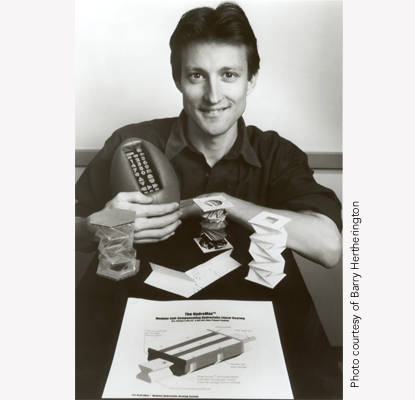Nathan Kane
Applying modern-day technology and materials to bellows—a flexible, pleated chamber to conduct air and keep dirt away from bearings—led Nathan Kane to redesign something that hadn't been modified since its inception in the Bronze Age! Kane was awarded the $30,000 Lemelson-MIT Student Prize in 1997 not only for his inventive talent to improve such a design, but also his dedication to encouraging young inventors via outreach programs.
One summer as a high school student, Kane took on the task of renovating his parent's house in Austin, TX to minimize dust for his father who suffered from respiratory allergies. During his labor, Kane devised an air mask for workers, which consisted of a light retractable air hose that supplies clean air to the eyes, nose and mouth from a blower/filter. This device became the basis for Kane's bellows design, which he developed through computer analysis—creating flexible folding patterns made of plastic that are low cost, less weight and can stretch twice as far as the original design. Other potential applications for his bellows include collapsible containers, expandable shelters and pumps.
Kane has additionally invented the Project-a-Sketch™—an opaque overhead projector that enables children to view their paintings or drawings onto a new type of industrial bearing on a wall. Working in collaboration on other inventions, Kane invented the HydroRail™ with his advisor Professor Alex Slocum—a modular hydrostatic bearing for machine tools; and the Pass-It™ with 1996 Lemelson-MIT Student Prize winner David Levy—a TV remote control designed to be thrown around like a football.
Kane's passion for inventing extends further than the items he designs. Serving as a role model to the local community, he has devoted much of his time encouraging and inspiring young inventors in initiatives such as assisting middle school students in building model solar cars and generating a "Recycler Contest" for high schools.
Currently employed by Transform Pharmaceuticals in Lexington, MA, Kane earned his BS (1991) and MS (1993) from the University of Texas and his PhD in Mechanical Engineering from MIT (1999). He remarks, "Thanks mainly to the Lemelson prize connection, several companies contacted me about using my bellows in their products." Kane worked with one potential company to build prototypes and is now collaborating with an independent inventor interested in his designs.


